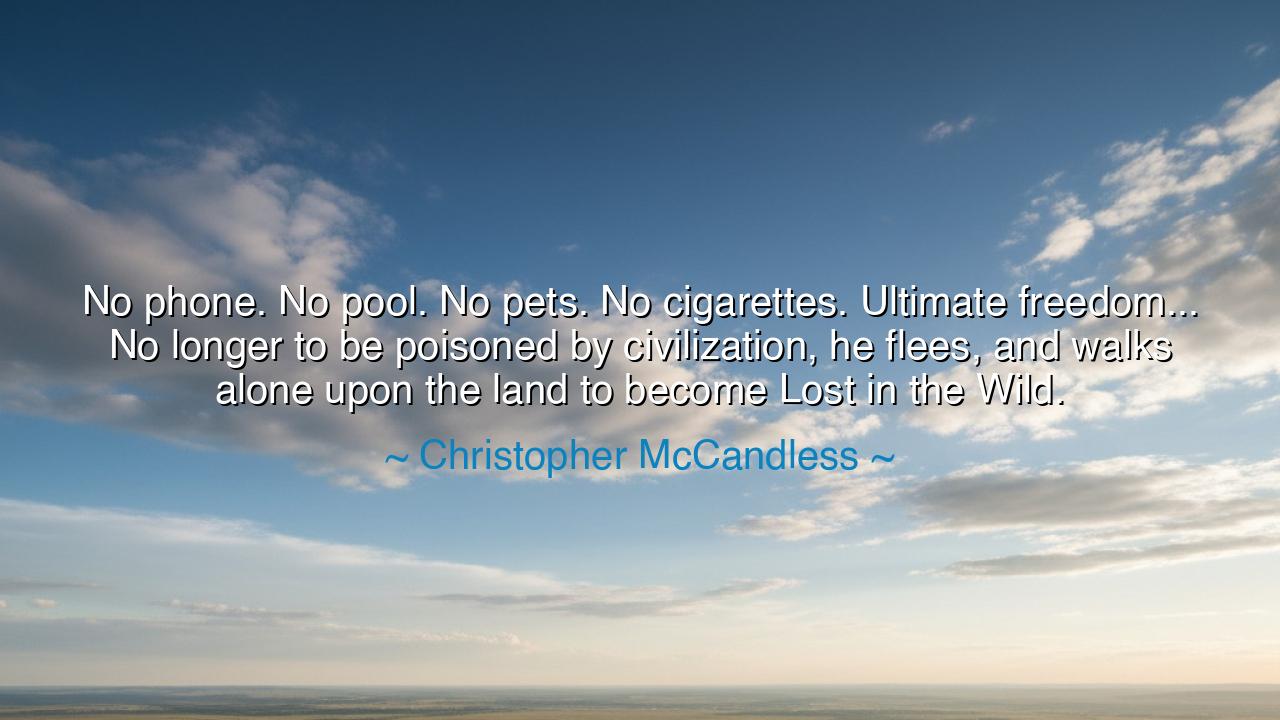
No phone. No pool. No pets. No cigarettes. Ultimate freedom... No
No phone. No pool. No pets. No cigarettes. Ultimate freedom... No longer to be poisoned by civilization, he flees, and walks alone upon the land to become Lost in the Wild.






"No phone. No pool. No pets. No cigarettes. Ultimate freedom... No longer to be poisoned by civilization, he flees, and walks alone upon the land to become Lost in the Wild." These words, penned by Christopher McCandless, reflect a profound yearning for liberation—a deep desire to shed the chains of modern civilization and to seek the kind of freedom that is only found in the wild, in the untainted wilderness of the earth. McCandless, in his quest for truth and authenticity, rejected the comforts of the world he knew, choosing instead to embrace the solitude of nature in its rawest form. For him, freedom was not found in the comforts of society or the distractions of technology, but in the simplicity of life lived according to nature's laws.
What McCandless sought is a freedom that transcends the superficial attachments of modern life: the constant noise of communication, the obligations of materialism, and the mundane rituals of everyday living. He yearned to be free from the poison of society's expectations, to cast off the trappings that bind us to a life of artificiality. In doing so, he chose to escape from the clutter of modern existence and embrace the wild—a place where one could exist untouched by the artificial constraints of the world. McCandless’ journey reflects the human desire to return to something more authentic, a raw connection with the earth, stripped of the distractions and entanglements of civilized life.
Consider the journey of Henry David Thoreau, another soul who sought freedom by fleeing from the complexities of society. In his book Walden, Thoreau tells of his time spent in solitude, living simply in a cabin by Walden Pond. Like McCandless, Thoreau rejected the material comforts and social structures that dominated the lives of most people. He believed that by retreating from civilization, one could reconnect with nature and discover deeper truths about life. Thoreau's words echo through the centuries: "Simplify, simplify"—a call to strip away the distractions that prevent us from seeing life clearly. His retreat into the wilderness was not a rejection of humanity but a path to self-discovery, just as McCandless sought in his own journey.
In the wild, McCandless sought to find a freedom that is unattainable in the rigid structures of society. But freedom, as he learned, is not simply the absence of obligations or the removal of external pressures; it is also the confrontation with the self. To walk alone in the wilderness is to be faced with the deepest parts of one’s soul—the fears, the doubts, and the struggles that are often drowned out by the noise of everyday life. McCandless found that in his solitude, his quest for freedom became a search for meaning. The wild, in its beauty and danger, became a mirror in which he saw his true nature reflected.
Yet, McCandless' journey also teaches us that true freedom is a double-edged sword. While the wilderness offers solitude and escape from the encumbrances of society, it also reveals the vulnerability that comes with independence. Self-reliance is a powerful force, but it also carries with it the weight of responsibility and the awareness that one is not truly separate from the world. In his final moments, McCandless grappled with the realization that he was alone in a way that he had not anticipated. The freedom he sought came at the cost of connection, and the very wilderness that promised liberation also brought him face to face with the fragility of life.
The lesson that McCandless imparts, then, is one of balance. It is not enough to simply flee from the constraints of civilization without considering the consequences of living outside of society. While he sought ultimate freedom, he found that such freedom comes with great sacrifice and loneliness. There is wisdom in embracing the world as it is, with all its complexities and responsibilities, while also carving out moments of solitude to reconnect with the deeper truths of existence. To walk the path of the wild is to embrace freedom, but to do so with the knowledge that we are not separate from the world; we are part of its tapestry.
In practical terms, McCandless’ journey reminds us that freedom is not a destination but a way of being. It is found in the choices we make to live authentically, to seek moments of solitude for introspection, and to reconnect with the world in its purest form. Yet, it also teaches us that we must remain connected to others, to community, and to the shared experience of human life. Ultimate freedom is not about escaping the world but about finding a way to live meaningfully within it. So, seek your own journey, but do so with the understanding that true freedom lies not in isolation, but in the balance between the wild and the world.






AAdministratorAdministrator
Welcome, honored guests. Please leave a comment, we will respond soon